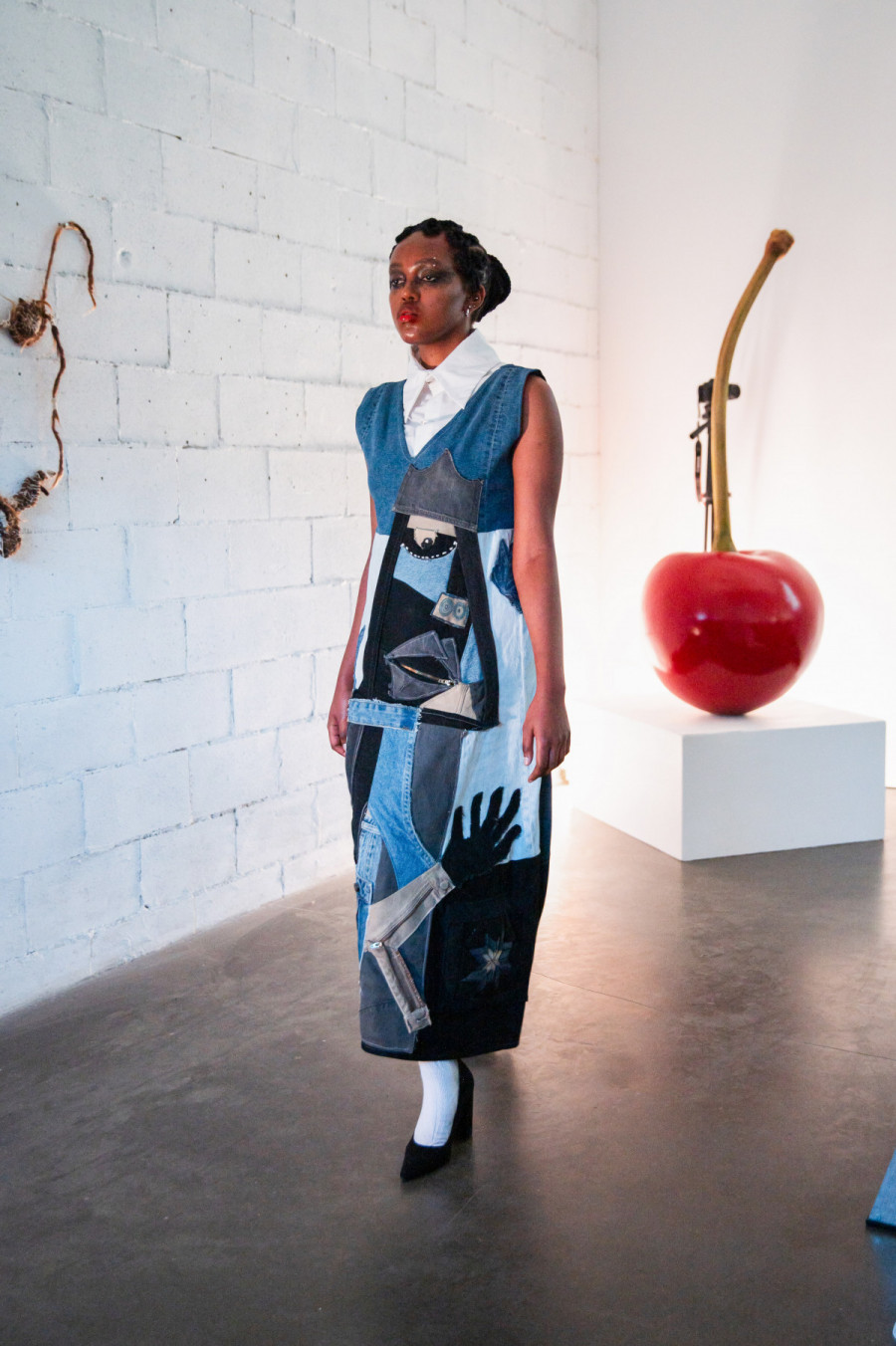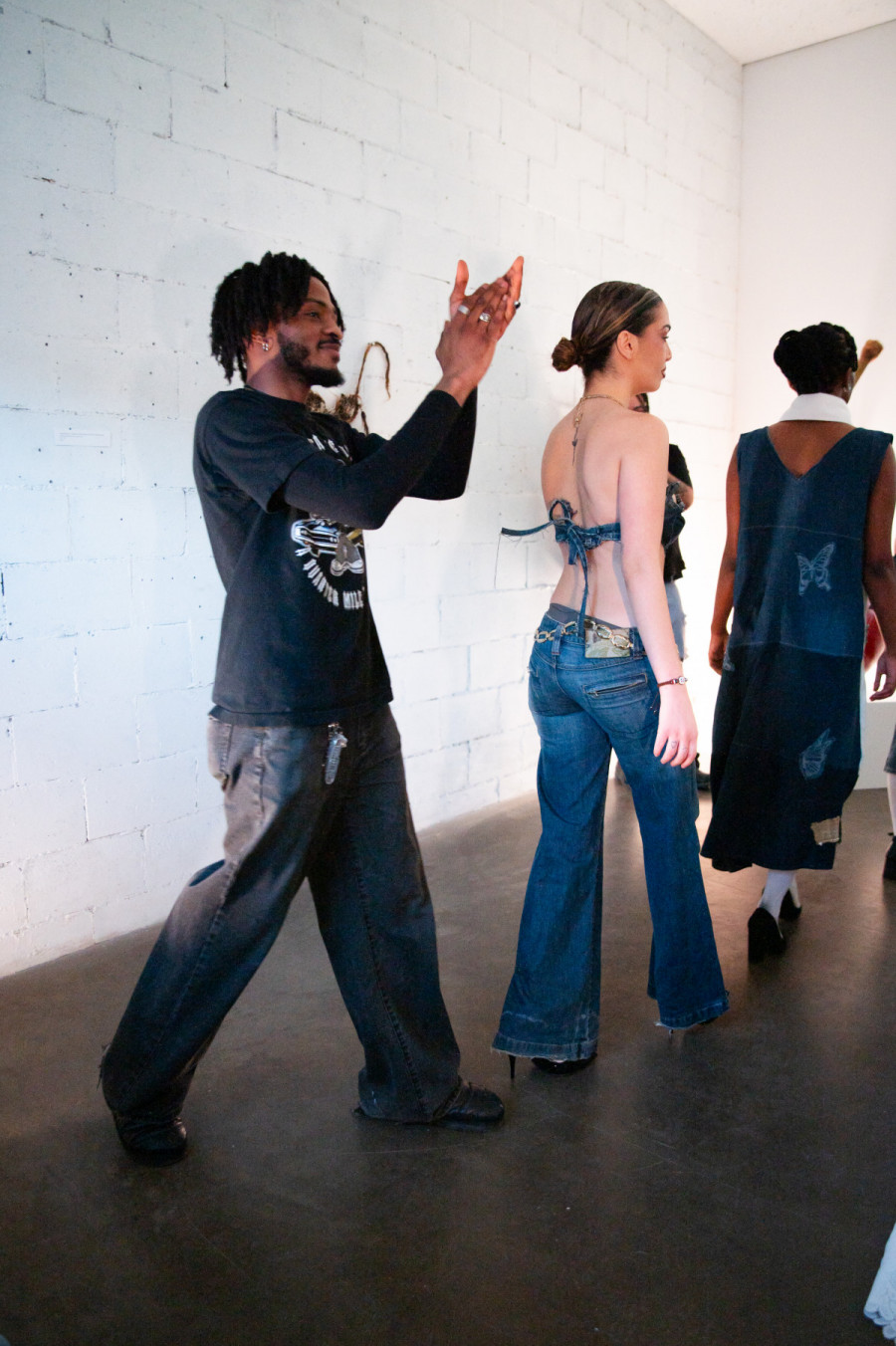Denim dreams
The aspirational magic of Joshua Onazi’s One Eye Sees
The first conversation between The Link and Joshua Onazi began with a bass guitar.
Onazi is a Concordia student and founder of the clothing brand One Eye Sees. Of his playing abilities, he said, "if you start with only a little bit, you can play around with that and use it [...] And it's the same thing with my art."
Onazi’s philosophy becomes apparent when one considers that, prior to buying his first sewing machine during the height of the COVID-19 pandemic, he had zero experience with clothing construction. Aside from technical drawing skills, which he picked up in high school and now uses when patternmaking, the engineering student-turned-designer insists that “there is no mastery- you just have to know what you like and go with that.’"
At the beginning of the pandemic, Onazi described feeling empty.
"Everyone felt bad, obviously, but I'm an international student so I didn't get to see anyone for so long," Onazi said.
Onazi is Nigerian, and the intense loneliness he felt while in Montreal was a far cry from the "vibrant community" in which he was raised.
During the 2021 lockdown, Onazi observed that his friends had begun using their extra time to kickstart passion projects, and, motivated by their proactive approach, decided it would be really cool to try and start something of his own.
He took inventory of his interests during a phone call with his sister. "I was just like, 'Well, what do I like? I like clothes. What do I need? A machine.' So I bought a machine on the phone," Onazi said.
"During quarantine, sewing saved me," he said.
Once the machine arrived, Onazi began creating clothes, starting with a pair of pants that he wasn't confident to wear outside his house. An opportunity to showcase his early work quickly arose with the African Student Association of Concordia. "They told me I had creative liberty to do what I wanted which allowed me to eliminate [any] expectations of what art should be," Onazi said.
The inaugural collection from One Eye Sees, titled The Journey of a Star, sees denim deployed as its primary textural and aesthetic reference point, with floor-length dresses crammed full of evocative motifs, Levi ties and reworked jean jackets. An original poem accompanied the collection's launch on Instagram. The lines "I cut along the template of the chalk constellations, And stitch the fabric of the culmination of ideas" best embody the transcendent ambitions that permeated the brand's early experiments.
Onazi describes the first collection as a vehicle for reflection, a lens through which people could look back at where they came from, internalize it, and create a conversation with themselves. He acknowledged that audiences may have difficulty connecting with his concept at first, but that's all part of what he believes makes the brand unique. "It's about creating. When I come to a blank canvas, it’s almost like I'm blind."
Ultimately, One Eye Sees asks people to "come to themselves and see what they find."
The Journey of A Star, assembled from thrift store scraps and on-campus donations, was important for another reason: it solidified Onazi's desire to create a brand centred around an ethos of sustainability rooted in slow fashion, a practice focusing on ethical production methods.
A newfound appreciation for the hours and intense labour required to make a piece of clothing, coupled with the fact that pieces “never fit,” means you'll never see Onazi buy fast fashion.
"The people who make [items for H&M or Zara] aren't making dollars, they are making cents," he said. "I know the work, and I know what it takes to make a garment so I feel like it should be appreciated." An effort to sell select items from the brand’s early line saw clothes going for several hundred dollars.
While Onazi is fixed at the creative helm of One Eye Sees, his friend Victor Okoro, a student in Concordia's computer engineering program, remains a close creative collaborator and was an early supporter of One Eye Sees. In addition to sourcing fabrics and other materials ripe for transformation, Okoro said he also brainstorms concepts, helps design pieces, cuts and reassembles materials and “also carry stuff around.”

“I know what it takes to make a garment so I feel like it should be appreciated.” — Joshua Onazi
Okoro and Onazi met in their first year at a football game. "We're both Nigerian, so that's kind of how we bonded, and we've been friends since," Okoro said.
Between his two jobs, flag football and soccer games, Okoro says he loves to dress up and thrift with Onazi whenever he can.
Okoro described the early days of what became One Eye Sees as an experiment in upcycling.
"I remember I would go on my skateboard and pick up ten or 20 pairs of jeans, and take them over to Joshua’s place and cut them up," Okoro said.
When asked about the attraction to denim, Okoro's answer was simple: "It's cheap, it's sustainable, and you can always find denim."
The question of whether One Eye Sees has any commercial future is a more complicated matter. It's a conversation Okoro and Onazi have returned to repeatedly over the past few years, and one which hasn't yet yielded a concrete answer.
"Most of the stuff we have now was supposed to be sold last year but didn't, for various reasons," said Okoro. "Right now, I think Joshua is just trying to do more shows and exhibits, so there's more emphasis on visual rather than wearable art."
The duo attempted a foray into retail recently at an artist collective in Little Italy called Chaque Mois, with mixed results. Both Onazi and Okoro visited the store often, and Okoro admits it was "cool to see people's reaction to the clothes."
When The Link probed Onazi in early March about his next project, he confided that he had already come up with a title and was working out a concept.
"I don't even know if I should say this, but I want to call it It's a War Outside. It won't be an entirely new collection, but more so an update of my first collection," Onazi said.
A few weeks later, The Link received an invitation to Onazi’s newly named showcase Luxury Goods, Luxury Bads, co-curated by Bailey Parkinson, and Adey Singer. The exhibit was hosted by Art Matters — North America's largest student-run arts festival.
At Produit Rien, the gallery chosen to host Art Matters and its leather-clad milieu, elaborate operatic trills accompanied the models as they sauntered slowly across a makeshift runway punctuated by several sculptural installations which included, among other things, a metre-high cherry and a table set with frosted cakes and layers of sherbet a là Marie Antoinette.
The room seemed to collectively hold its breath as Onazi's clothes made their way across the room. Guests spilled out of the gallery and onto the adjoining street, as students wearing everything from oversized patchwork trench coats to fishnets and hand-painted clogs craned their necks to catch a glimpse of the clothes.
The clothes appeared fiercely tailored but, unlike traditional couture, allowed their imperfections to shine through. One could still see the threadbare edge where a slab of denim had been sliced. Lacquered and deliberately messy, the makeup amplified the show's theatrics and punk Renaissance motifs.
Several hours after the show, as guests lingered in clusters across the gallery, one felt as though the art still moved about the room. Between shoulder blades, it was possible to catch a streak of red or purple, remnants of makeup that models decided not to remove.
Nine Bill, a Montreal stylist and fashion journalist enlisted by designer Hannah Silverking to capture behind-the-scenes footage, described the atmosphere as “really calm […] relaxing but with strong emotions.” Bill was glad to see Montreal creatives in the spotlight, highlighting the “crucial” role events, such as the one hosted by Art Matters, play in discovering new talent.
Like his models, the innovations of Onazi's clothing are difficult to ignore. One Eye Sees is proof that while fashion remains a poignant domain for artistic expression, it is possible to incorporate social and environmental responsibility within its savoir-faire.
This article originally appeared in Volume 44, Issue 13, published April 2, 2024.





_1_600_375_90_s_c1.jpg)

